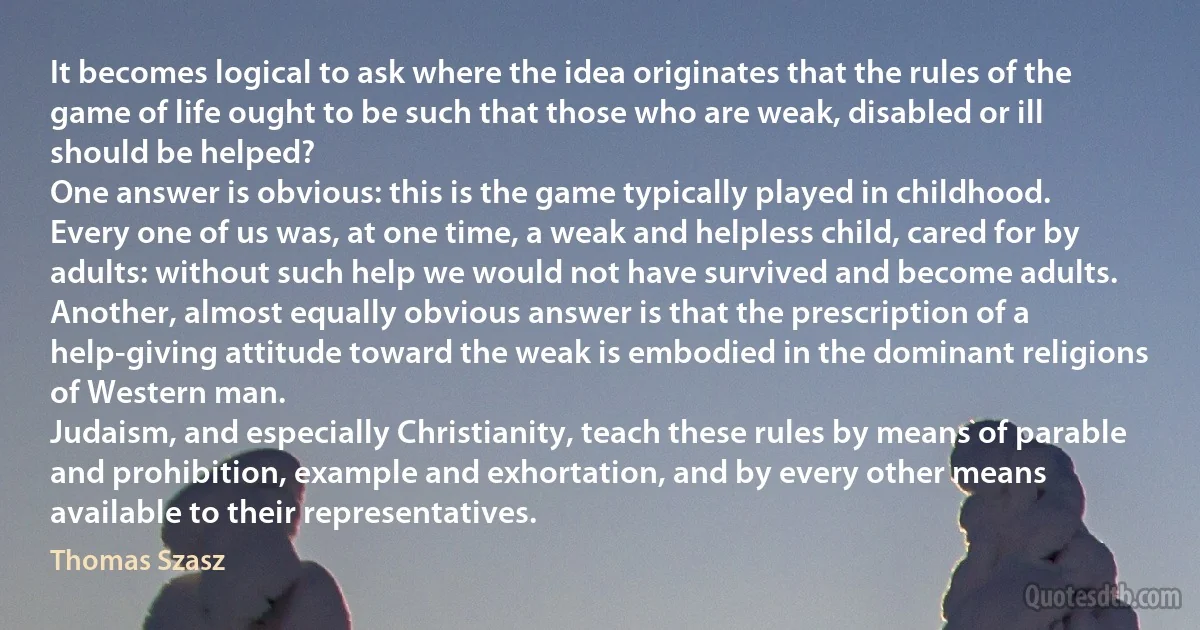
It becomes logical to ask where the idea originates that the rules of the game of life ought to be such that those who are weak, disabled or ill should be helped? One answer is obvious: this is the game typically played in childhood. Every one of us was, at one time, a weak and helpless child, cared for by adults: without such help we would not have survived and become adults. Another, almost equally obvious answer is that the prescription of a help-giving attitude toward the weak is embodied in the dominant religions of Western man. Judaism, and especially Christianity, teach these rules by means of parable and prohibition, example and exhortation, and by every other means available to their representatives.
Thomas SzaszRelated topics
almost answer ask child childhood dominant example exhortation game help idea ill judaism life man ought parable prescription should teach time western means rulesRelated quotes
He began to think about semblance, as Ansky had discussed it in his notebook, and he began to think about himself. He felt free, as he never had in his life, and although malnourished and weak, he also felt the strength to prolong as far as possible this impulse toward freedom, toward sovereignty. And yet the possibility that it was all nothing but semblance troubled him. Semblance was an occupying force of reality, he said to himself, even the most extreme, borderline reality. It lived in people's souls and their actions, in willpower and in pain, in the way memories and priorities were ordered. Semblance proliferated in the salons of the industrialists and in the underworld. It set the rules, it rebelled against its own rules...it set new rules.

Roberto Bolaño
If you listen carefully, in what most definitely must be called Gospel you yourself will hear also rigorousness. For example, what Jesus says to the centurion from Capernaum, "If we will apply these words to ourselves, we are obliged to say, "Be it done for you as you believe; if you have faith unto salvation, then you will be saved.” (Matthew 8:13) How lenient, how merciful! But is it also certain, then, that I have faith-I surely cannot summarily transfer to myself the fact that the centurion believed, as if I had faith because the centurion had it. Let us suppose that someone asked Christianity, "Is it also certain, then, that I have faith?” Christianity would answer, "Be it done for you as you believe.”.

Søren Kierkegaard
China, up to 50 years ago, was completely non-homogenous, being compartmented into groups divided against each other. The war-making tendency was almost non-existent, as they still followed the tenets of the Confucian ideal of pacifist culture. At the turn of the century, under the regime of Chang Tso Lin, efforts toward greater homogeneity produced the start of a nationalist urge. This was further and more successfully developed under the leadership of Chiang Kai-Shek, but has been brought to its greatest fruition under the present regime to the point that it has now taken on the character of a united nationalism of increasingly dominant, aggressive tendencies.

Douglas MacArthur
While it is possible to play a single game, unrelated to any other game events past or future, it is the campaign for which these rules are designed. It is relatively simple to set up a fantasy campaign, and better still, it will cost almost nothing. In fact you will not even need miniature figures, although their occasional employment is recommended for real spectacle when battles are fought. A quick glance at the Equipment section of this booklet will reveal just how little is required. The most extensive requirement is time. The campaign referee will have to have sufficient time to meet the demands of his players, he will have to devote a number of hours to laying out the maps of his "dungeons" and upper terrain before the affair begins.

Gary Gygax
We do not, of course, write literary criticism at all now. Academe has won the battle in which Wilson fought so fiercely on the other side. Ambitious English teachers now invent systems that have nothing to do with literature or life but everything to do with those games that must be played in order for them to rise in the academic bureaucracy. Their works are empty indeed. But then, their works are not meant to be full. They are to be taught, not read. The long dialogue has broken down. Fortunately, as Flaubert pointed out, the worst thing about the present is the future. One day there will be no... But I have been asked not to give the game away. Meanwhile, I shall drop a single hint: Only construct!

Gore Vidal
